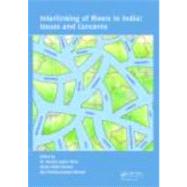- ISBN: 9780415404693 | 041540469X
- Cover: Hardcover
- Copyright: 7/25/2008
Inter-basin water transfers are complex human interventions on natural systems that can have profound adverse as well as beneficial social, economic and environmental implications. India's plan to interlink its rivers (ILR) and to transfer water may, according to one set of views, generate positive benefits through improved and expanded irrigation and may also contribute to flood and drought hazards mitigation for India, although the magnitudes are debatable. However, there are opposing views, in the context of India itself, that the interlinking plan is economically prohibitive, fraught with uncertainties, and has potential for disastrous and irreversible adverse after-effects. Water deficit can be reduced through improved water management without large scale engineering interventions. Moreover many of the rivers involved, particularly in the Himalayan component, are international and, therefore, the scheme has major implications for other riparians. Indeed, the planned transfer of water from the Ganges and Brahmaputra rivers will adversely impact Bangladesh socially, economically and environmentally---unless arrangements are made to maintain historical flows, which is unlikely to be feasible. Any multipurpose storage reservoirs in upstream countries, such as Nepal and Bhutan, would facilitate energy generation and other benefits but will also cause adverse environmental and social impacts to these countries. Therefore, the ILR plan will further complicate existing water sharing and management problems between India and other co-basin countries. Strengthening and expansion of cooperative efforts among the co-basin countries for water resources development and sharing can generate economic benefits for the people of these countries and also foster co-riparian relationships.






